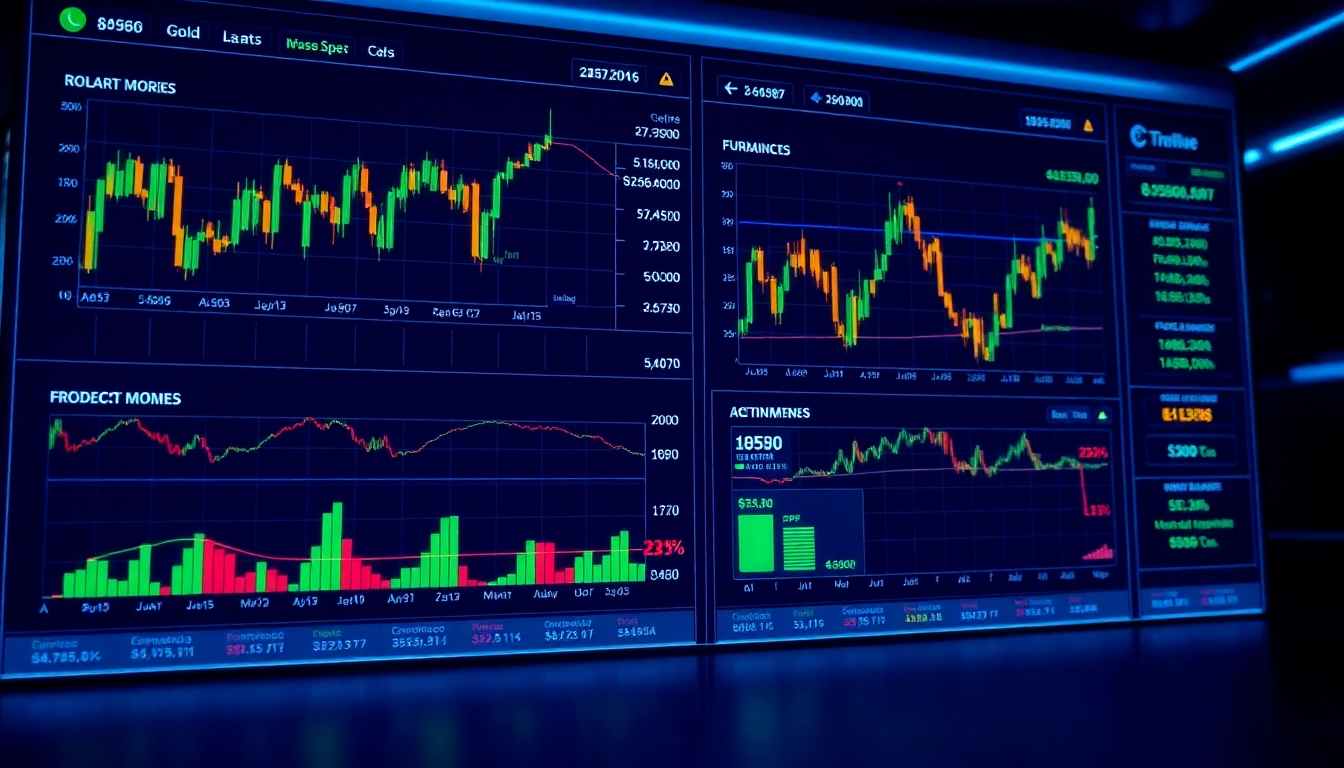
Maximizing Your Success with a Robust UK Trading and Investment Platform
In the fast-evolving landscape of global finance, choosing the right UK Trading and Investment Platform is vital for traders and investors aiming to capitalize on market opportunities and safeguard their assets. With stock markets exhibiting mixed signals—European shares closing marginally higher, gold reaching new all-time highs, and currencies fluctuating—the importance of leveraging advanced, reliable, and compliant trading platforms has never been greater. This comprehensive guide explores how to optimize your trading setup, stay ahead of market trends, and implement innovative strategies to achieve sustained success in the UK financial ecosystem.
Understanding the Fundamentals of a UK Trading and Investment Platform
Key Features and Functions of Leading Platforms
At the heart of successful trading lies a platform’s core features. Leading UK platforms offer real-time data feeds, advanced charting tools, multi-asset coverage—including equities, forex, commodities, and cryptocurrencies—and seamless order execution. For instance, recent market insights reveal that platforms integrating AI-driven analytics enable traders to interpret vast datasets efficiently, improving decision-making accuracy. Innovative features such as customizable dashboards, automated trading algorithms, and social trading modules foster engagement, empower novice traders, and enhance overall portfolio management.
Legal and Regulatory Considerations in the UK
Ensure your platform complies with FCA regulations, including rigorous security standards and investor protection measures. Transparency in fee structures, clear user agreements, and adherence to anti-money laundering (AML) protocols are fundamental. The recent discussions around digital currencies, such as Facebook’s Libra (now Diem), highlight the importance of regulatory compliance when integrating cryptocurrencies. Understanding these legal frameworks ensures your platform operates within the UK’s strict regulatory environment, minimizing legal risks and enhancing user trust.
Benchmarking Top-Performing Systems and Tools
Studying industry leaders reveals key differentiators: robust security protocols, user-friendly interfaces, and advanced analytical tools. For instance, platforms like Robinhood and Coinbase successfully combine ease of use with compliance and security, contributing to their rapid growth. Benchmarking involves assessing features like liquidity, order execution speed, and customer support efficiency. Adopting best practices from top performers helps set a high operational standard and aligns your platform with evolving market demands.
Enhancing User Experience and Engagement
Designing Intuitive Interfaces for Traders
Intuitive design reduces cognitive load and allows traders to execute strategies swiftly. This entails clean layouts, contextual tooltips, and responsive interfaces adaptable to desktops and mobile devices. Data shows that platforms with simplified navigation improve user satisfaction and retention. Incorporating dark modes, customizable widgets, and streamlined onboarding processes significantly increases platform adoption among diverse investor profiles.
Personalization and User Support Features
Personalized dashboards and tailored notifications keep traders informed and engaged. Implementing AI-driven recommendation engines can suggest investment opportunities aligned with user behavior and risk appetite. Additionally, 24/7 live chat, chatbots, and comprehensive FAQs provide immediate assistance, enhancing trust and reducing frustration. For example, Meta’s integration of AI models into internal tools exemplifies how personalization boosts user engagement, a strategy that can be modeled for UK platforms.
Integrating Educational Resources for Investors
Educational content—webinars, tutorials, and market analyses—empowers users to make informed decisions. Platforms that offer structured learning paths foster investor confidence and promote responsible trading. Notably, with the rise of cryptocurrencies such as Bitcoin and Ether, providing resources elucidating blockchain technology and market volatility is essential. These educational initiatives lead to more engaged users and foster long-term platform loyalty.
Implementing Advanced Trading Technologies
Utilizing Real-Time Data Analytics
Timely insights drive profitable trades. Advanced platforms employ high-frequency data analysis, leveraging market depth, order flow, and sentiment indicators. During periods of market volatility—like those seen with mixed stock indices and soaring gold prices—real-time analytics can help traders identify entry and exit points swiftly. Implementing cloud-based data processing ensures scalability and reduces latency, crucial for executing rapid trades in volatile markets.
Incorporating AI and Automation Tools
Artificial Intelligence enables predictive modeling, risk assessment, and automated trading. For example, AI can analyze historical data to forecast trends, such as potential bullish runs in Bitcoin if the 200-week trendline remains intact. Automation also facilitates 24/7 trading, freeing traders from constant monitoring. These tools are especially vital amid changing macroeconomic conditions, like U.S. rate cut expectations, which influence forex and commodities markets.
Security Protocols for Safeguarding Investments
With rising cyber threats, robust security measures—multi-factor authentication, encryption, biometric verification, and regular security audits—are indispensable. Regulatory frameworks mandate safeguarding client data and assets, which align with international standards such as GDPR. Implementing AI-driven fraud detection systems further enhances security, ensuring trader confidence amidst volatile markets and high-profile incidents, like SEC actions impacting crypto trading revenues.
Strategies for Market Differentiation and Growth
Developing Innovative Trading Products
Differentiate your platform through niche offerings: social trading features, ESG-focused investment options, or tokenized assets. The recent surge in NFT market cap exceeding $9.3 billion illustrates the growing importance of alternative digital assets. Integrating such innovative products attracts diverse investor segments willing to explore new opportunities, especially amid fluctuating traditional markets like the recent gold record highs and oil’s weekly gains.
Building Strategic Partnerships within the UK Market
Partnering with established financial institutions, fintech firms, and blockchain entities accelerates platform growth. Collaboration with regulators ensures compliance and facilitates access to new markets, such as with the recent UK discussions on Libra-like digital currencies. Strategic alliances also enable sharing of technological expertise, expanding infrastructure capabilities and customer base.
Measuring Performance and Adjusting for Market Trends
Establish KPIs such as platform uptime, order execution speed, and user engagement levels. Continuously analyze market data—like oil’s weekly movements or equities’ responses to geopolitical events—and adapt features accordingly. Regular updates, user feedback, and benchmarking against competitors create a dynamic platform capable of thriving amid global financial shifts.
Future Trends and Regulatory Changes in UK Trading Platforms
Impact of Digital Currencies and Blockchain Technology
The adoption of cryptocurrencies and blockchain innovations promises to transform trading landscapes. UK platforms must integrate digital currencies responsibly, complying with upcoming regulations—such as AML/KYC enhancements—to facilitate secure transactions. Innovations like stablecoins could stabilize crypto markets, while tokenization offers new avenues for asset management, capitalizing on recent market advances.
Upcoming UK Financial Regulations and Compliance
Regulators are expected to tighten controls on crypto trading, enhance anti-fraud measures, and improve investor protections. Keeping abreast of these changes is critical. Platforms that proactively implement compliance measures, such as real-time AML screening and rigorous data protection policies, will gain a competitive edge and build investor confidence.
Adapting to Global Economic Shifts and Market Volatility
Global events—such as geopolitical tensions influencing oil prices or U.S.-China trade relations—affect market stability. Platforms should incorporate adaptive algorithms that respond swiftly to such shifts, offering hedging options and risk management tools. Staying flexible in strategy and technology adoption positions your platform to navigate uncertainties successfully.







